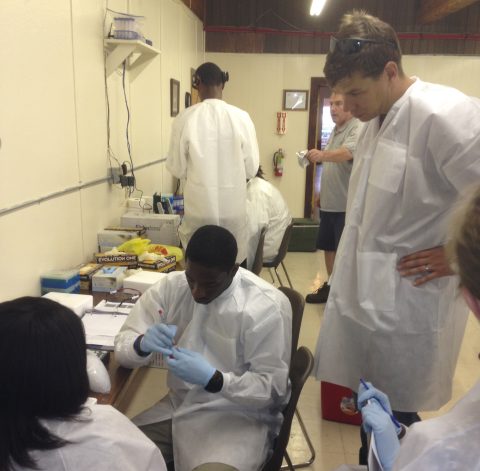Enzyme Research At PEEC
Author: admin
Newark students conduct enzyme field research at PEEC with University of Tennessee
June 6, 2013
High school students from Malcolm X Shabazz in Newark spent 3 days at the Pocono Environmental Education Center (PEEC) conducting field research with Dr. Andrew D. Steen from The University of Tennessee. The students collected and tested water samples looking for five different protein degrading enzymes, which are key in the conversion of plant material into carbon dioxide (CO2) and are important for understanding the global carbon cycle. This was cutting edge research the students actively worked on, as four of these enzymes had never before been measured in freshwater.
The field research at PEEC was funded by a Teacher Innovation Fund Grant from the Foundation for Newark’s Future.
Attached is a video of Dr. Steen interviewed by Saskieya A., a senior at Malcolm X. Shabazz High School: http://www.youtube.com/watch?v=6sObxmG6zdY
Malcolm X Shabazz Students Conduct Field Research at PEEC
February 18, 2013
MXS/UT Collaborate in Scientific Research
Malcolm X Shabazz (MXS) High School students continue their collaboration with researchers, Dr. Karen Lloyd and Dr. Andrew Steen, at the University of Tennessee (UT) department of Microbiology that began earlier this school year. The MXS/UT alliance has been studying enzyme activities in aquatic ecosystems (streams, estuaries and the ocean) near Newark, NJ. Students and teachers in their classrooms periodically meet with UT professors in their laboratories via Skype, where question and answer sessions reveal to students the process of scientific discovery.
MXS students are working with UT researchers on a primary research project focused on understanding how bacteria acquire food in the streams, estuaries and coastal ocean of New Jersey. The collaboration will culminate in two weeks of field research in which MXS students will work with UT scientists to measure the activities of protein-degrading in New Jersey and nearby waters. “These enzymes are a key intermediate in the conversion of plant material into carbon dioxide (CO2) and therefore serve as a control on the rate of global warming. UT professors and MXS students will collaborate to measure a set of enzymes which have never been previously measured in freshwater, so we expect that this collaboration will result in valuable, novel scientific data.”, explains Dr. Lloyd.
MXS students have begun by using Google Scholar to identify and examine scientific papers to gain exposure to the state-of-the-art in protein enzyme research. Dr. Lloyd remarked that she was pleased by the type of questions asked by MXS students. And just this week, MXS was awarded a Teacher Innovation Fund Grant from the Foundation for Newark’s Future (FNF), which enables MXS to purchase scientific instrumentation as well as fund two scientific expeditions. “This lets us obtain primary data. There is even the possibility that we will submit our findings for scientific publication.”, said Mr. Murray, teacher and grant writer.
Dr. Steen and his colleagues have made some recent discoveries making the UT/MXS effort especially promising, so everyone has high hopes of discovering something new. Dr. Steen said, “Most advances in knowledge are small, others are large. And some discover nothing.” Even though no one can predict the experimental findings, everyone experiences how to conduct science at the frontier of knowledge.
Ms. Nang Chi, a chemistry teacher at MXS, is familiar with the scientific research process and has previously worked as an industrial chemist. She has been preparing to purchase and house the new scientific instruments which will be used to gather the primary experimental data. Ms. Chi and Mr. Murray co-advise the Math and Science Club at MXS, where student researchers scour the internet for relevant research papers. Ms. Chi commented, “Students have already found one or two papers which are quite good.” So students see for themselves that to move science forward, they must first read and re-read scholarly papers and gain exposure to the work of other scientists.
Experiment procedures have been designed and continue to be refined by Dr. Steen, an enzyme expert. Students spent some time examining his first-cut experimental protocol, with the understanding that over time, it might change. Recent developments by Dr. Steen have called for an update. “Science doesn’t always go according to plan.”, explained Dr. Steen. Students laughed out loud. Dr. Steen will travel to MXS to prep students prior to their joint expedition to the Pocono Environment Education Center (PEEC) on May 20, 21, and 22. PEEC Environmentalists are identifying numerous water sources for potential testing.
During the PEEC experiments, Dr. Lloyd will be diving on Alvin, the deep-water submersible craft. She is looking into conducting a Skype session with MXS students at PEEC while she is at sea, weather permitting. Dr. Lloyd also offered to obtain a sample from the bottom of the Gulf of Mexico for the enzyme experiment. With a little luck, perhaps students could witness that sampling process. Students found that offer hard to refuse!
